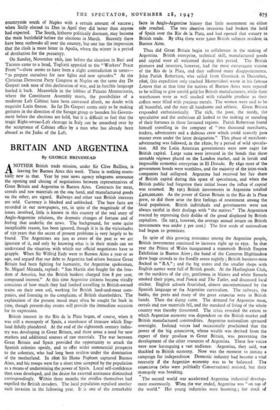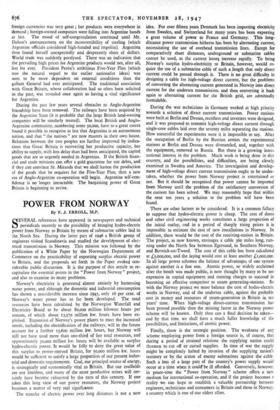BRITAIN AND ARGENTINA
By GEORGE BRINSMEAD
ANOTHER British trade mission, under Sir Clive Baillieu, is leaving for Buenos Aires this week. There is nothing essen- tially new in that. Year by year news agency telegrams announce the opening and closing of negotiations between representatives of Great Britain and Argentina in Buenos Aires. Contracts for meat, cereals and raw materials on the one hand, and manufactured goods on the other, are signed. Railways and other vast British interests are sold. Currency is blocked and unblocked. The bare facts are recorded in our newspapers, yet, in spite of the magnitude of the issues involved, little is known in this country of the real story of Anglo-Argentine relations, the dramatic changes of fortune and of feeling that underlie the news. The background, for some quite inexplicable reason, has been ignored, though it is in the vicissitudes of iso years that the secret of present problems is very largely to be found. The Argentines are just as aware of the past as we are ignorant of it, and only by knowing what is in their minds can we understand the situation with which our official negotiators have to grapple. When Sir Wilfrid Early went to Buenos Aires a year or so ago, and argued that our debt to Argentina had arisen because Great Britain had been fighting for humanity, the Argentine spokesman, Sr. Miguel Miranda, replied : " San Martin also fought for the free- dom of America, but the British bankers charged him 8 per cent. compound interest." At this time Argentine citizens became vividly conscious of how much they had loathed travelling in British-owned trains on their own soil, working for British land-and-meat com- panies, and listening to the complaints of British shareholders. The explanation of the present mood must often be sought far back in time, though present-day events will provide the immediate occasion for its expression.
British interest in the Rio de la Plata began, of course, when it was still a monopoly of Spain, a storehouse of treasure which Eng- land fitfully plundered. At the end of the eighteenth century indus- try was developing in Great Britain, and there arose a need for new markets and additional sources of raw materials. The war between Great Britain and Spain provided the opportunity to attack the Spanish colonies openly, and to offer wider commercial prospects to the colonists, who had long been restless under the domination of the motherland. In r806 Sir Home Popham captured Buenos Aires, and his troops were for a short time accepted by the population as a means of undermining the power of Spain. Local self-confidence then soon developed, and the desire for external assistance diminished correspondingly. Within three months the criollos themselves had expelled the British invaders. The local population repulsed another such invasion in the following year. It is one of the remarkable facts in Anglo-Argentine history that little resentment on either side resulted. The two abortive invasions had broken the hold of Spain over the Rio de la Plata, and had opened that estuary to British trade. By 1824 there were 3,00o British subjects resident in Buenos Aires.
Thus did Great Britain begin to collaborate in the making of Argentina. British enterprise, technical skill, manufactured goods and capital were all welcomed during this period. The British pioneers and investors, however, had the most extravagant visions of the Rio de la Plata, and they suffered many disappointments. John Parish Robertson, who sailed from Greenock in December, i806, (his expedition only reached Montevideo) wrote in his famous Letters that at that time the natives of Buenos Aires were reputed to be willing to give untold gold for British manufacturers, while their warehouses were as well stocked with valuable produce as their coffers were filled with precious metals. The women were said to be all beautiful, and the men all handsome and athletic. Great Britain responded enthusiastically. The rich, the poor, the needy, the speculative and the ambitious all looked to the making or mending of their fortunes in those favoured regions. Parish Robertson found himself travelling in the company of " two thousand merchants, traders, adventurers and a dubious crew which could scarcely pass muster even under the latter designation." This phase of merchant- adventuring was followed, in the r82os, by a period of wild specula- tion. All the Latin American governments were now eager for British capital. Large sums were invested in the bonds that these unstable regimes placed on the London market, and in lavish and impossible economic enterprises in El Dorado. By 1840 most of the government bonds were worthless, and the majority of the joint-stock companies had collapsed. Argentina had received her fair share of British capital during this spate of speculation, and when the British public had forgotten their initial losses the influx of capital was resumed. By 1913 British investments in Argentina totalled £400,000,000. As the power of Great Britain in the Rio de la Plata grew, so did there arise the first feelings of resentment among the local population. British individuals and governments were not always tactful in their dealings with " the natives." The Argentines reacted by expressing their dislike of the greed displayed by British capitalists. (In 1913, however, the average annual return on British investments was under 5 per cent.) The first seeds of nationalism had begun to germinate.
In spite of this growing resistance among the Argentine people, British investments continued to increase right up to 1931. In that year the Prince of Wales inaugurated a mammoth British Empire Exhibition in Buenos Aires ; the band of the Cameron Highlanders drew huge crowds to the floodlit arena nightly ; British business-men flocked to " B.A." ; and the big stores and the smaller shops with English names were full of British goods. At the Hurlingham Club, on the outskirts of the city, gentlemen in blazers and white flannels smoked their pipes, read Punch and The Taller, and discussed local cricket. English schools flourished, almost uncontaminated by the Spanish language or the Argentine curriculum. The railways, the banks, the ports and many of the great estancias were in British hands. Then the slump came. The demand for Argentine meat, cereals and raw materials fell, and the standard of living of the whole country was thereby threatened. The crisis revealed the extent to which Argentine economy was dependent on the British market and British manufactured commodities. Argentine nationalism sprouted overnight. Isolated voices had occasionally proclaimed that the power of the big estancieros, whose wealth was derived from the export of their produce to Great Britain, was preventing the development of the other resources of Argentina. These few voices were now haranguing a vast audience. -Argentina, they said, was shackled to British economy. Now was the moment to initiate a campaign for independence. Domestic industry had become a vital necessity if the Argentina economy was to be balanced. The estancieros (who were politically Conservatives) resisted, but their monopoly was breaking.
The second world war accelerated Argentine industrial develop- ment enormously. When the war ended, Argentina was "on top of the world." Her young industries were booming ; her stock of
foreign currencies was very great ; her products were everywhere in demand ; foreign-owned companies were falling into Argentine hands at last. The mood of self-congratulation continued until Mr. Dalton's announcement on the inconvertibility of sterling (which Argentine officials considered high-handed and impolite). Argentina then found herself unexpectedly and desperately short of dollars. World trade was suddenly paralysed. There was an indication that the prevailing high prices for Argentine products would not, after all, last for ever. President Peran's ambitious Five-Year Plan (which was the natural sequel to the earlier nationalist ideas) was seen to be more dependent on external conditions than the gallant General had ever anticipated. The traditional association with Great Britain, whose collaboration had so often been solicited in the past, was revealed once again as having a vital significance for Argentina.
During the past few years several obstacles to Anglo-Argentine friendship have been removed. The railways have been acquired by the Argentine State (it is probable that the large British land-owning companies will be similarly treated). The local British and Anglo- Argentine community, numbering some 50,00o, have to a great extent found it possible to recognise at last that Argentina is an autonomous nation, and that " the natives " are now masters in their own house. Relations between the two peoples are further improved by indica- tions that Great Britain is recovering her productive capacity, her ability to supply, with leis delay than had been anticipated, the capital goods that are so urgently needed in Argentina. If the British finan- cial and trade missions can offer a gold guarantee for our debts, and if they can convince Sr. Miranda that we shall hasten the production of the goods that he requires for the Five-Year Plan, then a new era of Anglo-Argentine co-operation will begin. Argentine self-con- fidence is no 'longer intractable. The bargaining power of Great Britain is beginning to revive.





























 Previous page
Previous page